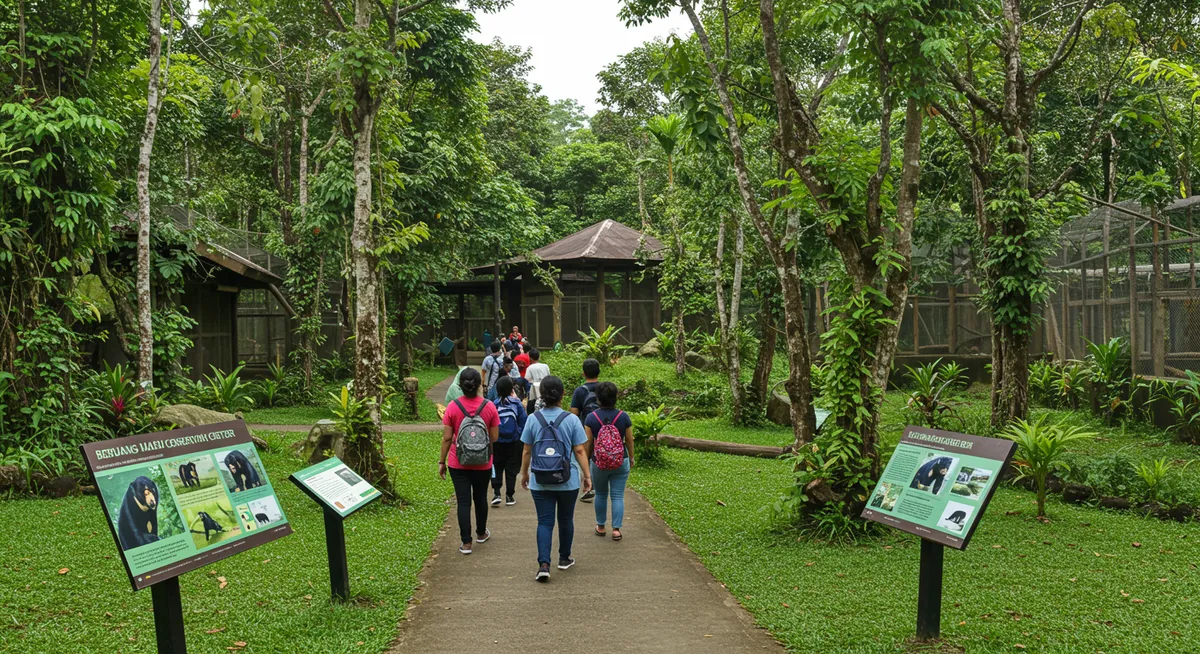
How to Visit Beruang Madu Conservation Center Balikpapan
Table of Contents
Want to find the best nature experiences for this destination? Chat with our nature tourism specialist!
Get Nature TipsCategory: how-to-visit-beruang-madu-conservation-center-balikpapan
Your Essential Guide to Visiting Beruang Madu Conservation Center Balikpapan
I've spent considerable time exploring Indonesia's natural wonders, and Balikpapan, with its rich biodiversity, has always been a highlight. Among its most compelling attractions is the Beruang Madu Conservation Center, a sanctuary dedicated to the world's smallest bear species, the sun bear. If you're wondering how to visit Beruang Madu Conservation Center Balikpapan, this guide will provide all the practical details and insights you need for a memorable and responsible trip to witness these fascinating creatures up close. It's an experience that truly connects you with wildlife conservation efforts.
Understanding the Beruang Madu Conservation Center
As someone passionate about wildlife, I can attest that the Beruang Madu Conservation Center, also known as the Balikpapan Sun Bear Sanctuary, is much more than a tourist attraction; it's a vital rescue and rehabilitation facility. This center focuses on protecting the endangered sun bear (Helarctos malayanus), educating the public about their plight, and rescuing those displaced by habitat loss. When you visit Beruang Madu Conservation Center Balikpapan, you're directly supporting these critical conservation efforts. Witnessing these intelligent creatures thrive in a protected environment offers a unique perspective on wildlife preservation in Borneo. It’s a truly humbling experience to observe the dedication of the staff.
Planning Your Visit: Essential Information
Before heading out, it's wise to gather some key details for your trip to the sun bear sanctuary. The Beruang Madu Conservation Center typically operates from 9:00 AM to 4:00 PM daily, though it’s always best to check their official website for any recent changes, especially during public holidays. Entrance fees are generally affordable, making it accessible for most budgets; expect to pay around IDR 30,000 to IDR 50,000 for foreign visitors. I've found that the early mornings or late afternoons are often the best times to visit Beruang Madu, as the sun bears tend to be more active when the weather is cooler. This also helps avoid larger crowds, ensuring a more peaceful viewing experience.
Getting There: Transportation Options
Reaching the Beruang Madu Conservation Center is relatively straightforward from downtown Balikpapan. Located a bit outside the city center, approximately 23 kilometers, taxis or ride-sharing apps like Grab are your most convenient options. The journey usually takes about 45 minutes to an hour, depending on traffic. You can also hire a private car with a driver for the day, which offers flexibility if you plan to visit other attractions like the Balikpapan Mangrove Center. While public transportation exists, it often involves multiple transfers and can be time-consuming for first-time visitors trying to visit Beruang Madu. My personal tip is to arrange your return trip in advance, especially if you're using ride-sharing, as connectivity can be spotty in the more rural areas.
Inside the Center: What to Expect
Once inside the Beruang Madu Conservation Center, you'll find well-maintained pathways leading to various viewing platforms. These platforms offer excellent vantage points to observe the sun bears in their spacious, semi-natural enclosures. You'll likely see bears foraging, climbing, and sometimes even napping in the sun – a truly engaging sight. Beyond the main sun bear enclosures, the center also provides educational information boards detailing the bears' behaviors, threats, and the importance of their conservation. I recommend taking your time to read these; they significantly enhance your understanding of the incredible work being done here. For more wildlife insights, and to discover the best nature attractions in Balikpapan, plan your itinerary comprehensively.
Tips for a Responsible & Rewarding Experience
To ensure a positive visit for both you and the sun bears, responsible tourism is key. Always follow the center's guidelines, especially regarding noise levels and not feeding the animals. Photography is permitted, but avoid flash photography as it can disturb the bears. Wearing comfortable walking shoes is advisable, as you'll be doing a fair amount of walking. Bringing a reusable water bottle is also a good idea. By adhering to these simple tips, you contribute to a peaceful environment for the sun bears and support the center's mission. For those exploring more of the region, Bukit Bangkirai Canopy Bridge offers another unique forest experience.
Frequently Asked Questions
What is the best time of day to see the sun bears active?
How long does a typical visit to the Beruang Madu Conservation Center take?
Is the Beruang Madu Conservation Center suitable for children?
Visiting the Beruang Madu Conservation Center Balikpapan is more than just a sightseeing trip; it’s an immersive experience that underscores the importance of wildlife protection. From understanding their critical role in the ecosystem to observing these fascinating creatures, your visit directly supports vital conservation efforts. Remember to plan your journey, observe responsibly, and cherish the opportunity to connect with Borneo's unique wildlife. For a deeper dive into Indonesia's natural beauty, consider exploring more from TouristNature.com.